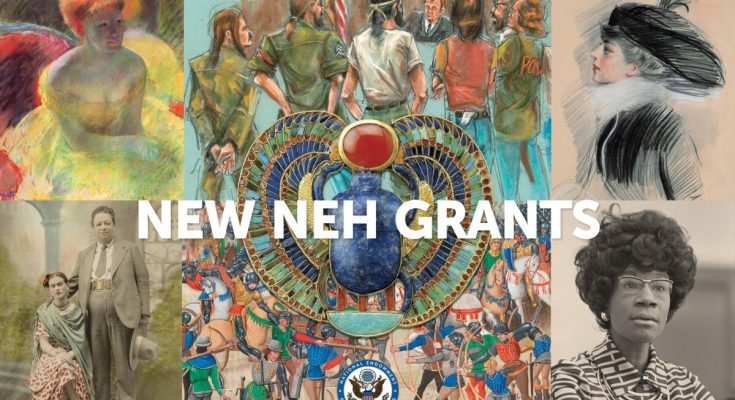Grant awards support humanities exhibitions and documentaries, programs at colleges and universities, expanding access to historical collections, sustainability projects at museums and archives, and scholarly research in the humanities.
WASHINGTON, DC (April 16, 2024): The National Endowment for the Humanities (NEH) today announced $26.2 million in grants for 238 humanities projects across the country.
New NEH grant awards will support exhibitions on the life and work of Mary Cassatt; on Belle da Costa Greene, the influential librarian who shaped the collections of the Morgan Library; on the life and legacy of Congresswoman Shirley Chisholm; and on connections between the Nile River and Ancient Egyptian’s customs around life and death. Funding will also enable production of a documentaries on the Vietnam Veterans Against the War, and on artists Frida Kahlo and Diego Rivera’s years in Detroit. Ninety-seven NEH Summer Stipends will support research by individual scholars on topics such as depictions of warfare in medieval English literature.
Grants awarded today will underwrite a new permanent exhibition at the Carnegie Museum of Natural History in Pittsburgh on how the Nile River shaped ancient Egyptians’ ideas of life and death; provide for treatment and digitization of photo collections at Appalshop documenting Appalachia’s social, cultural, and economic history that were damaged by catastrophic flooding in Kentucky; and support archaeological research at the sites of two former boarding schools on the Blackfeet reservation in Montana.
“From studies of the impact of emerging technologies on humans to new documentaries that lift up undertold stories, these projects show how the humanities help us understand ourselves and our world,” said NEH Chair Shelly C. Lowe (Navajo). “NEH is proud to support 238 exemplary new education, preservation, research, and public programs that will expand our nation’s cultural resources and foster learning in communities across the country.”
Several new NEH awards will support the development of curricula, courses, and educational programs at two- and four-year colleges and universities. Spotlight on Humanities in Higher Education grants, which fund humanities projects that benefit underserved populations at small institutions, will allow for the creation of a series of new Spanish courses at Walters State Community College in Tennessee to help students gain linguistic proficiency and cultural competency related to their future careers. These grants will also create open educational “archaeogaming” resources that use immersive footage from commercial video games accompanied by maps, photos, voiceovers, and other historical and instructional materials to teach middle school and undergraduate students about ancient history. Other funding will help develop an interdisciplinary undergraduate minor in health humanities at Florida Atlantic University and a new minor in data science and humanities at Old Dominion University. At the Medical College of Wisconsin, NEH funding will support a discussion program for military veterans focusing on the ways war memorials and poetry reflect the experiences of war.
New funding for projects that bring the lessons of history and culture to broad public audiences include grants for a two-hour documentary film on civil rights activist and NAACP leader Walter White and for the production of podcast series on the history of the American Revolution, the culture and history of the Uyghurs of China’s Xinjiang province, and the legacy of the WPA’s Federal Writers’ Project of the 1930s. Additional grants will support the first major U.S. retrospective exhibition on the life and work of Impressionist painter Mary Cassatt in more than twenty-five years and underwrite a new permanent exhibition at the High Desert Museum in Oregon on the history and cultural traditions of Native American communities of the Indigenous Plateau.
Thirty-three new NEH Humanities Collections and Reference Resources grants will help preserve and expand public access to important historical records and humanities collections at archives, libraries, and museums across the country. Among the newly funded projects is an effort to digitize a rapidly deteriorating collection of thousands of public television programs produced by the American Samoa station KVZK documenting traditional Samoan song, dance, ceremonies, and other cultural practices, along with the economic and democratic development of the territory. A project at George Mason University will create a digital archive of graffiti left behind by Union and Confederate soldiers at historical sites in Northern Virginia, containing individuals’ names, hometowns, regimental units, jokes, political statements, Bible verses, and pleas for help, offering a unique window into Civil War military service. Other funding will digitize and put online a century’s worth of records of the history of Christiansburg Institute, an educational organization in Appalachia established by the Freedmen’s Bureau in 1866 that educated thousands of African American students until its closure in 1966.
Grants awarded as part of NEH’s Dangers and Opportunities of Technology: Perspectives from the Humanities program, which funds research examining technology and its relationship to society through the lens of the humanities, will support work on a book on the use of artificial intelligence to generate and disseminate disinformation to influence, manipulate, or deceive audiences; a history of life-support technology in the United States and how it changed American culture and health care in the 20th century; and an analysis of the ways individuals in creative industries engage with generative artificial intelligence technologies and its potential impact on arts and culture.
Five organizations were awarded NEH Climate Smart grants, which support cultural institutions in conducting environmental assessments to anticipate and plan for operational, physical, and financial risks posed by climate-related events. Funding will support a partnership between the Nelson-Atkins Museum and the Linda Hall Library to develop a strategic plan for a pilot Cultural Eco-District in Kansas City, Missouri, and underwrite a comprehensive risk assessment of factors such as rising sea levels, encroaching wetlands, and extreme storm events that endanger the infrastructure, artifacts, and operations of Historic Jamestowne in Virginia.
NEH Summer Stipends will support 97 humanities scholars in undertaking archival research for books and articles on the rise of U.S. public libraries during the Reconstruction Era, international touring exhibitions of artifacts from the tomb of Tutankhamun in the 1960s and 70s as an extension of Egypt’s Cold War diplomacy efforts in the run-up to building the Aswan Dam, and the contributions of Asian and Asian American artists to the staging and performance of Puccini’s opera Madama Butterfly from WWII to the present.
Seven NEH Fellowship Programs at Independent Research Institutions grants will fund fellowships for humanities scholars at libraries, museums, and centers for advanced study such as the National Humanities Center, the Schomburg Center for Research in Black Culture, and the Huntington Library.
This award cycle also includes five new NEH Dynamic Language Infrastructure–Documenting Endangered Languages grants. Administered in partnership with the National Science Foundation (NSF), these awards fund research, fieldwork, and the preparation of linguistic resources that document languages at risk of extinction. Among these are a fellowship to create a dictionary of Tamayame, a Keres language with fewer than 100 remaining native speakers in the Pueblo of Santa Ana in central New Mexico; and funding for work on a grammar of Stau, an endangered Sino-Tibetan language spoken in northwestern Sichuan, China.
These peer-reviewed grants were awarded in addition to $65 million in annual operating support provided to the national network of state and jurisdictional humanities councils.
A full list of grants by geographic location is available here.
Grants were awarded in the following categories:
| Archaeological and Ethnographic Field Research | Support institutionally based empirical field research that uses archaeological or ethnographic methods to answer significant questions in the humanities5 grants, totaling $596,738 |
| Climate Smart Humanities Organizations | Strengthen the institutional base of the humanities by funding organizational assessments and strategic planning that sustain and protect historical, cultural, educational, intellectual, and physical assets from the risk of climate change5 grants, totaling $1.1 million |
| Dangers and Opportunities of Technology: Perspectives from the Humanities | Support humanistic research that explores the relationship between technology and society19 grants, totaling $1.9 million |
| Dialogues on the Experience of War | Support the study and discussion of important humanities sources about war and military service.4 grants, totaling $351,993 |
| Documenting Endangered Languages–Dynamic Language Fellowships and Senior Research Grants | Joint initiative between NEH and the National Science Foundation (NSF) to support fieldwork and other activities relevant to recording, documenting, and archiving endangered languages, as well as the preparation of transcriptions, databases, grammars, and lexicons of languages that are in danger of being lost.5 grants, totaling $300,000 |
| Fellowship Programs at Independent Research Institutions | Provide scholars with research time and access to resources beyond what is available at their home institutions7 grants, totaling $2.1 million |
| Humanities Collections and Reference Resources Grants | Allow institutions to preserve, and provide access to, collections essential to scholarship, education, and public programming in the humanities 33 grants, totaling $8.9 million |
| Humanities Connections | Connect non-humanities fields to the humanities curriculum at two- and four-year institutions 18 grants, totaling $1.7 million |
| Media Projects: Development and Production Grants | Support the preparation of media programs, including radio, podcasts, television, and long-form documentary films, for distribution 10 grants, totaling $4.4 million |
| Public Humanities Projects: Exhibitions | Support permanent, temporary single-site, and multi-venue traveling humanities exhibitions 10 grants, totaling $2.4 million |
| Public Humanities Projects: Historic Places | Support the interpretation of historical sites, houses, neighborhoods, and regions 1 grant, totaling $499,956 |
| Spotlight on Humanities in Higher Education | Support smaller humanities projects at small- to medium-sized two- and four-year higher education institutions that benefit underserved populations22 grants, totaling $1.1 million |
| Summer Stipends | Support full-time work by a scholar on a humanities project for a period of two months 97 grants, totaling $582,000 |
National Endowment for the Humanities: Created in 1965 as an independent federal agency, the National Endowment for the Humanities supports research and learning in history, literature, philosophy, and other areas of the humanities by funding selected, peer-reviewed proposals from around the nation. Additional information about the National Endowment for the Humanities and its grant programs is available at www.neh.gov.
Media Contacts:Paula Wasley: | pwasley@neh.gov





